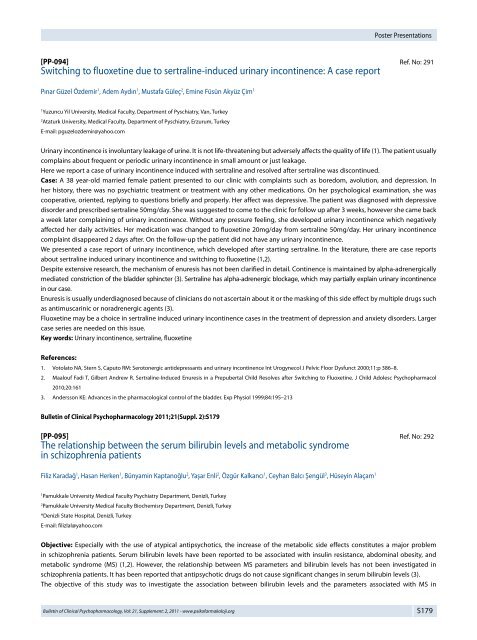SYMPOSIA
SYMPOSIA
SYMPOSIA
Create successful ePaper yourself
Turn your PDF publications into a flip-book with our unique Google optimized e-Paper software.
Bulletin of Clinical Psychopharmacology, Vol: 21, Supplement: 2, 2011 - www.psikofarmakoloji.org<br />
Poster Presentations<br />
[PP-094] Ref. No: 291<br />
Switching to fluoxetine due to sertraline-induced urinary incontinence: A case report<br />
Pınar Güzel Özdemir 1 , Adem Aydın 1 , Mustafa Güleç 2 , Emine Füsün Akyüz Çim 1<br />
1 Yuzuncu Yil University, Medical Faculty, Department of Pyschiatry, Van, Turkey<br />
2 Ataturk University, Medical Faculty, Department of Pyschiatry, Erzurum, Turkey<br />
E-mail: pguzelozdemir@yahoo.com<br />
Urinary incontinence is involuntary leakage of urine. It is not life-threatening but adversely affects the quality of life (1). The patient usually<br />
complains about frequent or periodic urinary incontinence in small amount or just leakage.<br />
Here we report a case of urinary incontinence induced with sertraline and resolved after sertraline was discontinued.<br />
Case: A 38 year-old married female patient presented to our clinic with complaints such as boredom, avolution, and depression. In<br />
her history, there was no psychiatric treatment or treatment with any other medications. On her psychological examination, she was<br />
cooperative, oriented, replying to questions briefly and properly. Her affect was depressive. The patient was diagnosed with depressive<br />
disorder and prescribed sertraline 50mg/day. She was suggested to come to the clinic for follow up after 3 weeks, however she came back<br />
a week later complaining of urinary incontinence. Without any pressure feeling, she developed urinary incontinence which negatively<br />
affected her daily activities. Her medication was changed to fluoxetine 20mg/day from sertraline 50mg/day. Her urinary incontinence<br />
complaint disappeared 2 days after. On the follow-up the patient did not have any urinary incontinence.<br />
We presented a case report of urinary incontinence, which developed after starting sertraline. In the literature, there are case reports<br />
about sertraline induced urinary incontinence and switching to fluoxetine (1,2).<br />
Despite extensive research, the mechanism of enuresis has not been clarified in detail. Continence is maintained by alpha-adrenergically<br />
mediated constriction of the bladder sphincter (3). Sertraline has alpha-adrenergic blockage, which may partially explain urinary incontinence<br />
in our case.<br />
Enuresis is usually underdiagnosed because of clinicians do not ascertain about it or the masking of this side effect by multiple drugs such<br />
as antimuscarinic or noradrenergic agents (3).<br />
Fluoxetine may be a choice in sertraline induced urinary incontinence cases in the treatment of depression and anxiety disorders. Larger<br />
case series are needed on this issue.<br />
Key words: Urinary incontinence, sertraline, fluoxetine<br />
References:<br />
1. Votolato NA, Stern S, Caputo RM: Serotonergic antidepressants and urinary incontinence Int Urogynecol J Pelvic Floor Dysfunct 2000;11:p 386–8.<br />
2. Maalouf Fadi T, Gilbert Andrew R. Sertraline-Induced Enuresis in a Prepubertal Child Resolves after Switching to Fluoxetine. J Child Adolesc Psychopharmacol<br />
2010;20:161<br />
3. Andersson KE: Advances in the pharmacological control of the bladder. Exp Physiol 1999;84:195–213<br />
Bulletin of Clinical Psychopharmacology 2011;21(Suppl. 2):S179<br />
[PP-095] Ref. No: 292<br />
The relationship between the serum bilirubin levels and metabolic syndrome<br />
in schizophrenia patients<br />
Filiz Karadağ 1 , Hasan Herken 1 , Bünyamin Kaptanoğlu 2 , Yaşar Enli 2 , Özgür Kalkancı 1 , Ceyhan Balcı Şengül 3 , Hüseyin Alaçam 1<br />
1 Pamukkale University Medical Faculty Psychiatry Department, Denizli, Turkey<br />
2 Pamukkale University Medical Faculty Biochemisry Department, Denizli, Turkey<br />
*Denizli State Hospital, Denizli, Turkey<br />
E-mail: filizlal@yahoo.com<br />
Objective: Especially with the use of atypical antipsychotics, the increase of the metabolic side effects constitutes a major problem<br />
in schizophrenia patients. Serum bilirubin levels have been reported to be associated with insulin resistance, abdominal obesity, and<br />
metabolic syndrome (MS) (1,2). However, the relationship between MS parameters and bilirubin levels has not been investigated in<br />
schizophrenia patients. It has been reported that antipsychotic drugs do not cause significant changes in serum bilirubin levels (3).<br />
The objective of this study was to investigate the association between bilirubin levels and the parameters associated with MS in<br />
S179



